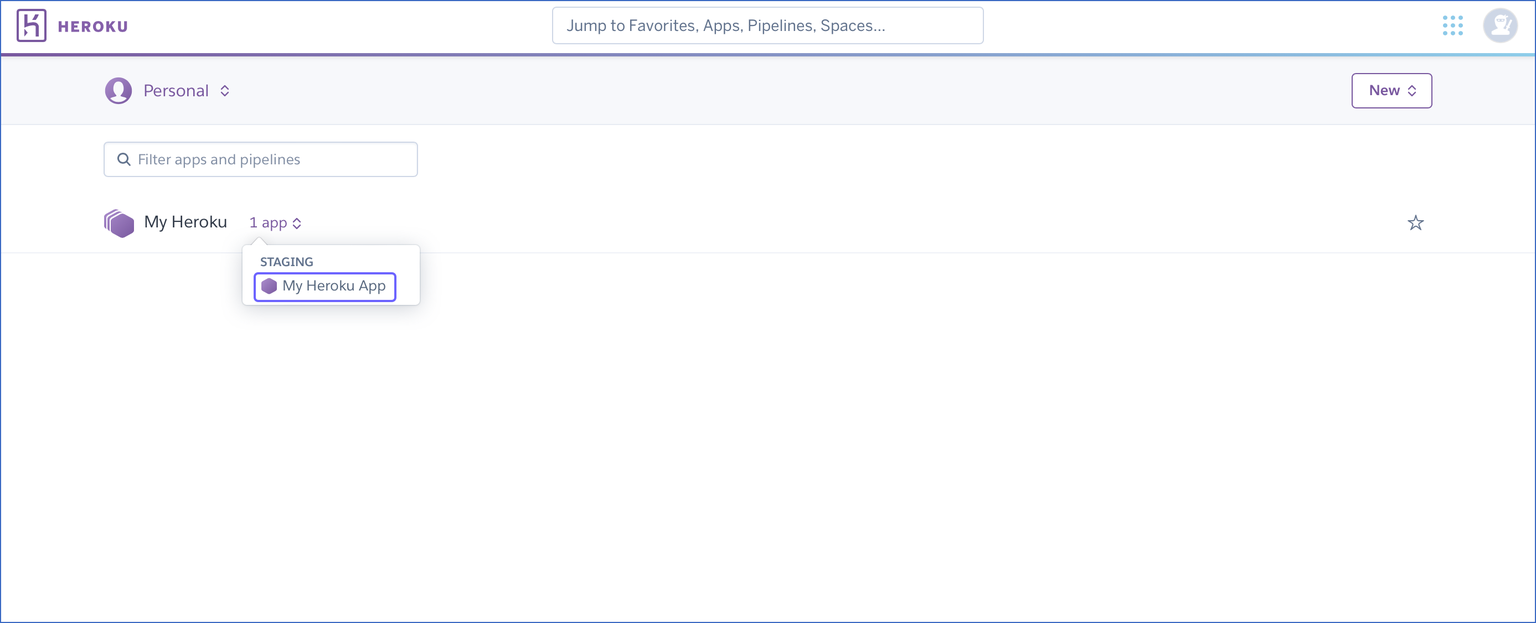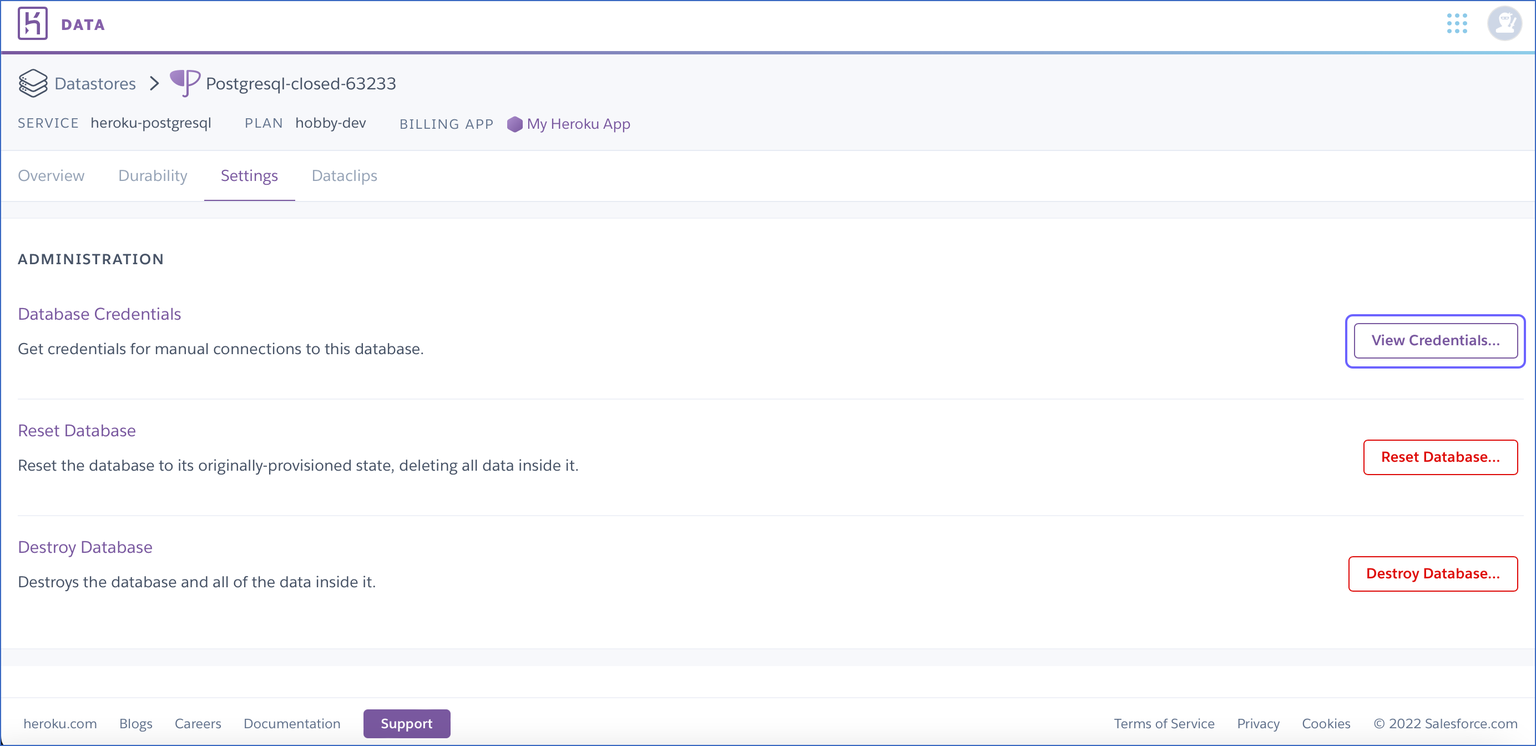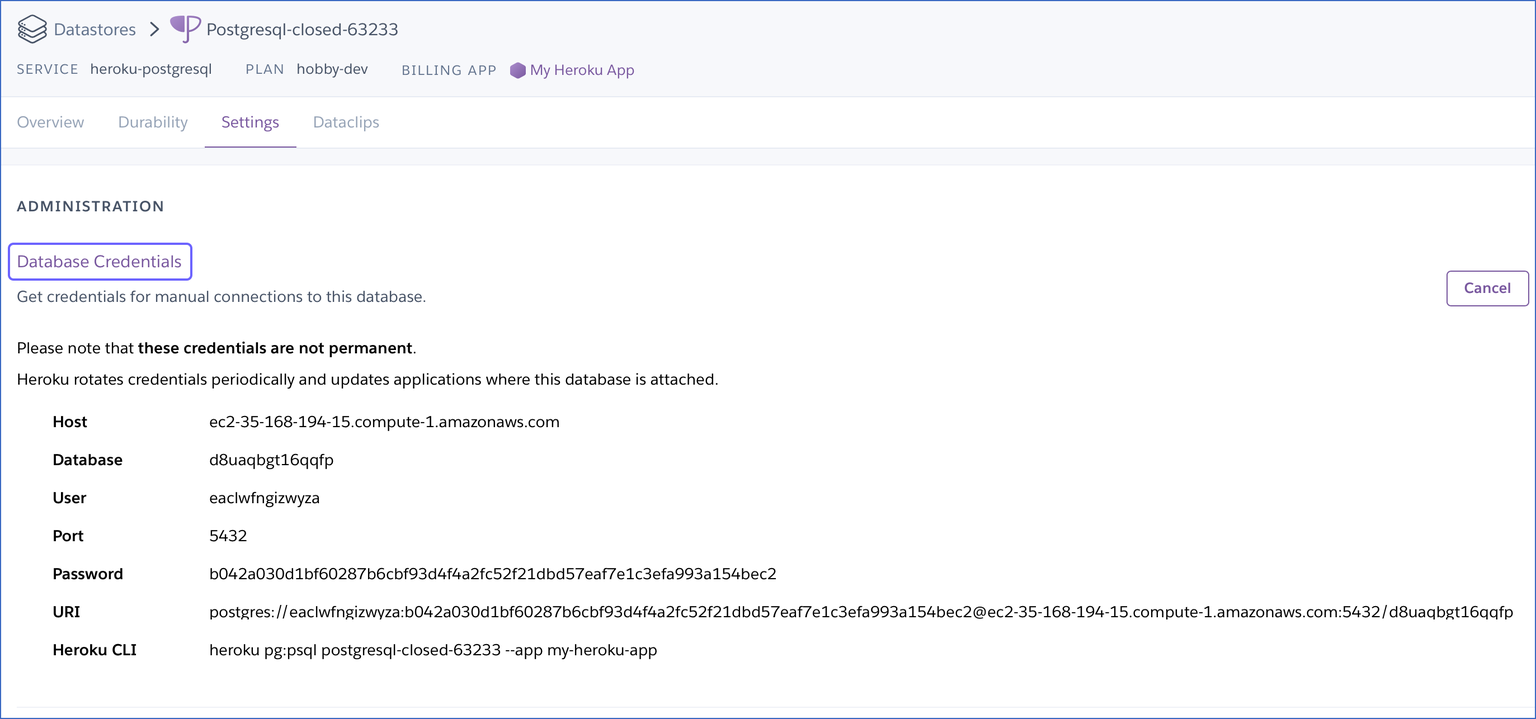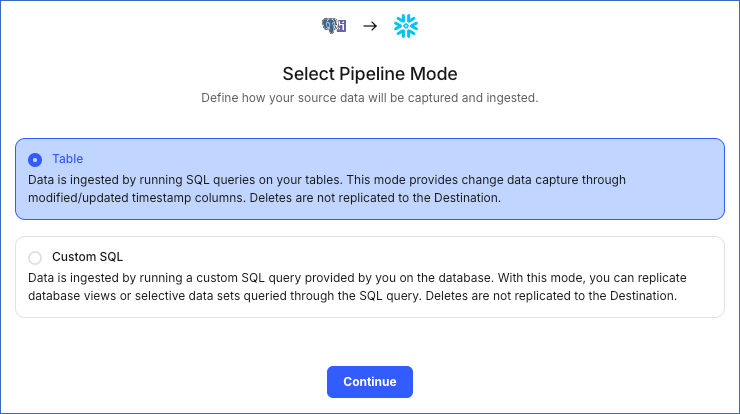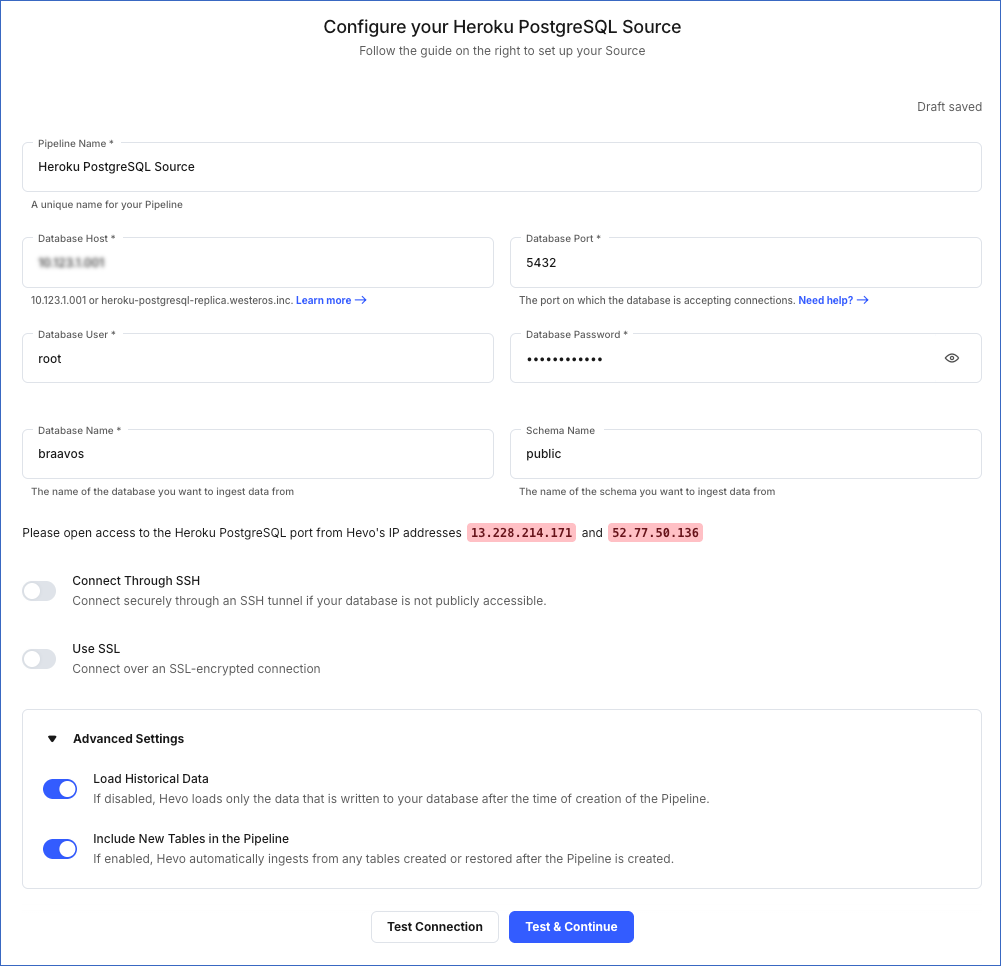Heroku PostgreSQL
On This Page
Starting Release 2.19, Hevo has stopped supporting XMIN as a query mode for all variants of the PostgreSQL Source. As a result, you will not be able to create new Pipelines using this query mode. This change does not affect existing Pipelines. However, you will not be able to change the query mode to XMIN for any objects currently ingesting data using other query modes.
Heroku PostgreSQL is Heroku’s reliable and powerful database as a service based on PostgreSQL. With the fully-managed Heroku Postgres, you can focus on getting the most out of your data without the admin overhead.
You can ingest data from your Heroku PostgreSQL database using Hevo Pipelines and replicate it to a Destination of your choice.
Heroku is a platform where you can deploy applications directly on the cloud. These applications can have add-ons such as databases and email services. To ingest your data, Hevo needs to access the application and the database within. A database can be shared by multiple apps. However, one app can only have one database.
Source Considerations
-
If you add a column with a default value to a table in PostgreSQL, entries with it are created in the WAL only for the rows that are added or updated after the column is added. As a result, in the case of log-based Pipelines, Hevo cannot capture the column value for the unchanged rows. To capture those values, you need to:
-
Restart the historical load for the respective object.
-
Run a query in the Destination to add the column and its value to all rows.
-
-
As Heroku does not support log-based replication, you must use Table or Custom SQL ingestion mode while creating your Pipeline in Hevo.
-
When you delete a row in the Source table, its XMIN value is deleted as well. As a result, for Pipelines created with the XMIN Pipeline mode, Hevo cannot track deletes in the Source object(s). To capture deletes, you need to restart the historical load for the respective object.
-
XMIN is a system-generated column in PostgreSQL, and it cannot be indexed. Hence, to identify the updated rows in Pipelines created with the XMIN Pipeline mode, Hevo scans the entire table. This action may lead to slower data ingestion and increased processing overheads on your PostgreSQL database host.
Note: The XMIN limitations specified above are applicable only to Pipelines created using the XMIN Pipeline mode, which is currently available for Early Access.
Limitations
-
The data type Array in the Source is automatically mapped to Varchar at the Destination. No other mapping is currently supported.
-
Hevo does not support data replication from foreign tables, temporary tables, and views.
-
If your Source data has indexes (indices) and constraints, you must recreate them in your Destination table, as Hevo does not replicate them from the Source. It only creates the existing primary keys.
-
Hevo does not set the
__hevo_marked_deletedfield to True for data deleted from the Source table using the TRUNCATE command. This could result in a data mismatch between the Source and Destination tables. -
Hevo supports only RSA-based keys for establishing SSL connections. RSA is an encryption algorithm used for certificate private keys. You must ensure that your SSL certificates and keys are RSA-based.
-
Hevo does not load data from a column into the Destination table if its size exceeds 16 MB, and skips the Event if it exceeds 40 MB. If the Event contains a column larger than 16 MB, Hevo attempts to load the Event after dropping that column’s data. However, if the Event size still exceeds 40 MB, then the Event is also dropped. As a result, you may see discrepancies between your Source and Destination data. To avoid such a scenario, ensure that each Event contains less than 40 MB of data.
See Also
Revision History
Refer to the following table for the list of key updates made to this page:
| Date | Release | Description of Change |
|---|---|---|
| Nov-05-2025 | NA | Updated the document as per the latest Hevo UI. |
| Oct-09-2025 | NA | Updated section, Specify Heroku PostgreSQL Connection Settings to add description for the Load Historical Data option. |
| Sep-18-2025 | NA | Updated section, Specify Heroku PostgreSQL Connection Settings as per the latest UI. |
| Aug-01-2025 | NA | Added clarification that data ingested from new and re-created tables is billable. |
| Jul-07-2025 | NA | Updated the Limitations section to inform about the max record and column size in an Event. |
| Jan-07-2025 | NA | Updated the Limitations section to add information on Event size. |
| Jun-27-2024 | NA | Updated section, Limitations to add information about Hevo supporting only RSA-based keys. |
| Apr-29-2024 | NA | Updated section, Specify Heroku PostgreSQL Connection Settings to include more detailed steps. |
| Mar-18-2024 | 2.21.2 | Updated section, Specify Heroku PostgreSQL Connection Settings to add information about the Load all CA certificates option. |
| Mar-05-2024 | 2.21 | Added the Data Replication section. |
| Feb-05-2024 | NA | Updated sections, Specify Heroku PostgreSQL Connection Settings and Object and Query Mode Settings to add information about the XMIN ingestion mode. |
| Jan-10-2024 | NA | - Updated section, Source Considerations to add information about limitations of XMIN query mode. - Removed mentions of XMIN as a query mode. |
| Nov-03-2023 | NA | Renamed section, Object Settings to Object and Query Mode Settings. |
| Oct-03-2023 | NA | - Updated sections: - Specify Heroku PostgreSQL Connection Settings to describe the schema name displayed in Table and Custom SQL ingestion modes, - Source Considerations to add information about logical replication not supported on read replicas, and - Limitations to add limitations about data replicated by Hevo. |
| Sep-19-2023 | NA | Updated section, Limitations to add information about Hevo not supporting data replication from certain tables. |
| Jun-26-2023 | NA | Added section, Source Considerations. |
| Apr-21-2023 | NA | Updated section, Specify Heroku PostgreSQL Connection Settings to add a note to inform users that all loaded Events are billable for Custom SQL mode-based Pipelines. |
| Dec-19-2022 | 2.04 | Updated section, Specify Heroku PostgreSQL Connection Settings to add information that you must specify all fields to create a Pipeline. |
| Dec-07-2022 | 2.03 | Updated section, Specify Heroku PostgreSQL Connection Settings to mention about including skipped objects post-Pipeline creation. |
| Dec-07-2022 | 2.03 | Updated section, Specify Heroku PostgreSQL Connection Settings to mention about the connectivity checker. |
| Sep-05-2022 | NA | Updated sections, Obtain PostgreSQL Database Credentials and Specify Heroku PostgreSQL Connection Settings for more clarity and detail. |
| Jul-04-2022 | NA | - Added section, Specify Heroku PostgreSQL Connection Settings and Object Settings. |
| Jan-24-2022 | 1.80 | Removed from Limitations that Hevo does not support UUID datatype as primary key. |
| Sep-09-2021 | 1.71 | Updated the section, Limitations to include information about columns with the UUID data type not being supported as a primary key. |
